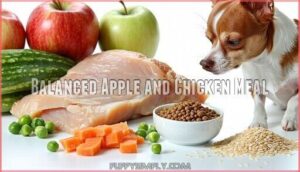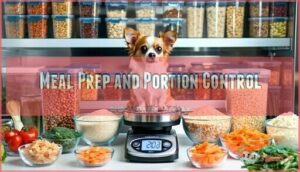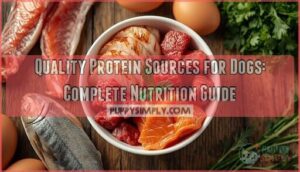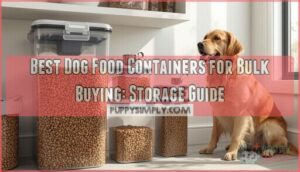This site is supported by our readers. We may earn a commission, at no cost to you, if you purchase through links.
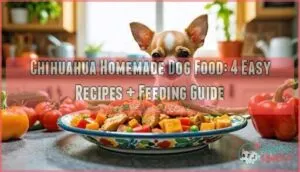 Making chihuahua homemade dog food gives you complete control over your tiny companion’s nutrition.
Making chihuahua homemade dog food gives you complete control over your tiny companion’s nutrition.
You’ll avoid mystery ingredients and preservatives while meeting their specific needs—18% protein for adults, balanced carbs, and quality fats.
Homemade meals prevent obesity, support heart health, and often cost less than premium commercial brands.
Your Chihuahua’s fast metabolism and small stomach require precise portions, making portion control easier with home preparation.
You can customize recipes for allergies or health conditions while ensuring fresh, wholesome ingredients.
The key lies in understanding proper nutritional ratios, safe preparation methods, and gradual shifts that keep your pocket-sized pup thriving on every carefully crafted bite.
Table Of Contents
- Key Takeaways
- Benefits of Homemade Food
- Nutritional Guidelines
- Homemade Food Recipes
- Preparation and Storage
- Feeding and Calorie Requirements
- Health Implications and Safety
- Frequently Asked Questions (FAQs)
- What is the best homemade food for a Chihuahua?
- How do you make homemade Chihuahua?
- Why is homemade Chihuahua food good for dogs?
- What do Chihuahua puppies eat?
- How long do you cook homemade dog food for Chihuahua?
- Where can I get homemade dog food?
- Can Chihuahuas eat homemade food?
- How much homemade food should I feed my Chihuahua?
- What do vets recommend for homemade dog food?
- Can I add supplements to homemade dog food for Chihuahuas?
- Conclusion
Key Takeaways
- You’ll save money and improve your Chihuahua’s health by controlling every ingredient—avoiding mystery additives while providing fresh, wholesome nutrition that often costs less than premium commercial brands.
- Proper nutritional balance is critical for tiny dogs—adult Chihuahuas need 18% protein, balanced carbs, and quality fats, with precise portions of ¼ to ½ cup twice daily based on their 40-50 calories per pound requirement.
- Gradual transition over 7-10 days prevents digestive upset—start with 25% homemade food mixed with 75% current kibble, gradually increasing the homemade portion while monitoring your dog’s response.
- Food safety and vet consultation are non-negotiable—cook proteins to proper temperatures, store meals for a maximum of 5 days refrigerated, and consult your veterinarian before switching to prevent nutritional deficiencies.
Benefits of Homemade Food
Making homemade food for your Chihuahua puts you in control of every ingredient that goes into their tiny body.
Complete control means complete peace of mind for your tiny companion’s health.
You’ll know exactly what nutrients they’re getting while avoiding mystery additives and preservatives commonly found in commercial kibble, which allows you to make informed decisions about their diet.
Fresh, wholesome ingredients mean healthier, happier Chihuahuas—no guesswork required
Healthy Eating Habits
Creating healthy eating habits for your Chihuahua starts with mindful feeding practices that support their unique nutritional needs.
Establishing a proper eating environment and maintaining portion awareness helps prevent common health issues while promoting proper chihuahua nutrition.
Key elements of healthy eating habits include:
- Mindful Feeding – Monitor your dog’s eating pace and behavior during meals
- Balanced Diet – Verify that homemade chihuahua food contains proper protein, fat, and carb ratios
- Portion Awareness – Measure servings based on your Chihuahua’s weight and activity level
- Food Variety – Rotate proteins and vegetables to prevent nutritional deficiencies
- Eating Environment – Create a calm, consistent space for stress-free meals
These practices form the foundation of excellent chihuahua health and support your dog’s overall well-being through proper chihuahua diet management.
Quality Control Over Ingredients
When you prepare homemade dog food, you control every ingredient that goes into your chihuahua’s bowl.
You choose the freshness matters approach by selecting organic options and avoiding additives found in commercial products.
Label reading becomes unnecessary when you source quality ingredients yourself.
This ingredient sourcing control means no mystery meat meals or chemical preservatives—just pure, wholesome dog food ingredients your chihuahua deserves, with no mystery meat.
Affordable and Healthier Option
Beyond saving money, homemade dog food offers superior cost savings compared to premium commercial brands.
You’ll control ingredient sourcing, ensuring fresh, quality components while managing portion control effectively.
This approach meets your Chihuahua’s specific dietary needs without expensive fillers or preservatives.
The investment in healthy dog food recipes supports long-term health, potentially reducing veterinary costs and extending your pet’s lifespan substantially.
Prevents Obesity and Diseases
When you control your chihuahua’s diet, you’re taking charge of disease prevention and healthy weight management.
Homemade chihuahua dog food lets you create nutrient-dense meals that support obesity control and heart-healthy nutrition.
This diet management approach helps prevent pancreatitis, joint problems, and diabetes while maintaining proper nutrition balance for your tiny companion’s long-term health.
By focusing on weight loss recipes, you can create a customized diet that meets your chihuahua’s specific needs and supports overall well-being.
Nutritional Guidelines
Understanding your Chihuahua’s nutritional needs is the foundation for creating balanced homemade meals.
These tiny dogs require specific ratios of protein, carbohydrates, fats, vitamins, and minerals to maintain their health and energy levels.
Protein Requirements
Your Chihuahua’s protein needs depend on life stage and health status.
Adult dogs require 18% protein in their diet, while puppies need 22-28% for proper growth.
Senior dogs maintain similar requirements unless kidney issues arise.
Protein Sources to prioritize:
- Lean meats like chicken, turkey, and beef provide complete amino acid profiles
- Fish offers high-quality protein plus omega-3 fatty acids for coat health
- Eggs boost digestibility with their perfect amino acid balance
Watch for deficiency signs like muscle weakness, dull coat, or slow healing.
Excess protein rarely harms healthy dogs but may stress compromised kidneys.
Carbohydrates and Fiber
Your Chihuahua needs carbohydrates for steady energy and brain function.
Rice, oats, and sweet potatoes make excellent carb sources with low allergen risks. These digestible options should comprise 20-35% of homemade dog food recipes.
Fiber from pumpkin and carrots supports gut health and prevents digestive issues. Cook all carbs thoroughly and introduce fiber gradually to avoid upset stomachs in your tiny companion, ensuring a healthy and happy homemade dog food experience.
Fats and Energy
Healthy fats serve as your Chihuahua’s most concentrated energy source, providing essential fatty acids for ideal skin and coat health.
Adult Chihuahuas require 5.5% dry matter fat, while growing puppies need 8.5% for proper development.
Quality fat sources include fish oil, coconut oil, and flaxseeds, which also serve as primary energy sources for canine diets.
Senior dogs benefit from omega-3 fatty acids to support joint health and energy metabolism in homemade dog food recipes.
Minerals and Vitamins
Your Chihuahua’s nutritional balance depends on precise mineral absorption and vitamin sources.
Calcium-to-phosphorus balanced ratios prevent bone issues, while B-complex vitamins support metabolism.
Deficiency symptoms include muscle tremors and immune problems.
Dog food supplements bridge gaps in homemade diets, but supplement dosage must match your dog’s size.
Dog vitamins guarantee complete nutrition when whole foods fall short.
Homemade Food Recipes
Creating homemade meals for your Chihuahua doesn’t require complicated recipes or hours in the kitchen.
These four simple recipes use common ingredients you likely have at home and can be prepared in under 30 minutes.
Turkey and Pumpkin Recipe
This turkey and pumpkin recipe combines lean protein with fiber-rich ingredients that’ll keep your Chihuahua’s digestive system happy.
Mix one pound ground turkey, half cup cooked pumpkin, quarter cup brown rice, and diced carrots.
Recipe variations include sweet potato substitutions, while ingredient sourcing from local farms guarantees quality.
You can find more turkey pumpkin dog products online.
Pumpkin benefits include improved digestion and weight management for small dog breeds, which is a key aspect of this recipe’s design to support overall canine health through natural ingredients.
Chicken and Rice Delight
This classic dog food recipe combines lean chicken with brown rice for maximum nutritional balance.
Cook one cup shredded chicken breast thoroughly, then mix with half cup cooked brown rice and diced carrots.
These cooking methods guarantee proper digestion for your Chihuahua’s sensitive stomach.
When ingredient sourcing, choose organic chicken for best results.
Recipe variations include adding green beans or sweet potato.
For larger breeds, homemade food offers increased lifespan benefits.
This homemade pet food provides complete nutrition when prepared fresh, and is a great way to ensure your pet’s overall health and wellbeing.
Balanced Apple and Chicken Meal
Simplicity meets nutrition when you combine tender chicken with sweet apple chunks in this wholesome dog food recipe.
The apple benefits include natural fiber and vitamins, while chicken nutrition provides essential protein for muscle development. This homemade pet food balances palatability with health, creating a Chihuahua diet that’s both appealing and nutritious.
Ingredient sourcing matters—choose organic apples and free-range chicken when possible. Recipe variations can include different apple varieties for meal palatability.
Mix 2 pounds boneless chicken, 1 diced apple, ½ cup each of peas and carrots, plus 1 cup brown rice with one egg for complete dog food ingredients. This recipe is a great example of how simplicity meets nutrition, and the importance of ingredient sourcing cannot be overstated, as it affects the overall palatability and health of the dish, making it a great wholesome dog food recipe.
Raw Homemade Meal
Raw dog food enthusiasts swear by the BARF Diet, which mimics natural canine nutrition.
This homemade raw dog food recipe combines one soft-boiled egg, two ounces of raw organ meats, one teaspoon plain yogurt, and three teaspoons mixed vegetable blend.
However, contamination risk and nutritional imbalance concerns require careful preparation and veterinary guidance before implementing BARF feeding protocols, especially to ensure a balanced and safe nutrition.
Preparation and Storage
Proper preparation and storage guarantee your homemade Chihuahua food stays fresh and safe while making mealtime easier for you.
Following simple guidelines for meal prep, portion control, and storage will help maintain nutritional quality and prevent food spoilage, which is crucial for the health of your Chihuahua, and making mealtime easier for you is a significant benefit.
Consistent Feeding Schedule
Your Chihuahua’s internal clock becomes your best ally when you establish feeding time at the same hours daily.
Schedule adherence creates routine benefits that extend beyond convenience—your pup’s digestive system functions perfectly when it anticipates meals.
This predictable pattern supports digestive health while reducing behavioral problems like food anxiety or begging.
Consistent feeding schedules also help monitor appetite changes that signal health concerns.
Meal Prep and Portion Control
Prep consistency makes feeding your Chihuahua stress-free. Plan weekly meal prep sessions to batch-cook recipes and divide into proper dog food portions.
Use a kitchen scale for portion accuracy – eyeballing doesn’t cut it for tiny dogs. Calculate portions based on your Chihuahua’s weight: typically ¼ to ½ cup twice daily.
For ideal storage, consider using containers designed for freezing. Store portioned meals in freezer-safe containers following proper freezing guidelines.
This approach guarantees dog weight management while simplifying your routine, making it a great way to ensure your Chihuahua’s meals are properly portioned.
Storage and Handling Guidelines
Store your homemade dog food in airtight containers to maintain freshness and prevent contamination.
Consider using proper food storage for ideal preservation.
Refrigerate portions for up to five days, ensuring proper fridge storage temperatures.
For longer dog food longevity, freezing portions works well for three months.
Always label containers with preparation dates for safe tracking.
When thawing safely, move frozen meals to the refrigerator overnight.
These dog food safety guidelines protect your Chihuahua’s health.
Gradual Transition to Homemade Food
Making the switch from commercial kibble to homemade meals requires patience and careful planning.
Your Chihuahua’s sensitive stomach needs time for digestive adaptation, so follow this gradual change timeline over 7-10 days:
- Days 1-2: Mix 25% homemade food with 75% current kibble
- Days 3-4: Increase to 50% homemade, 50% kibble ratio
- Days 5-6: Serve 75% homemade food with 25% kibble
- Days 7-8: Offer 100% homemade meals
- Monitor closely: Watch for texture changes in stools and allergy monitoring signs
During dietary adjustments, supplement introduction should wait until your pup fully adapts.
Schedule a vet consultation if digestive issues persist beyond the adjustment period.
Feeding and Calorie Requirements
Getting your Chihuahua’s portions right is essential since these tiny dogs need only 40-50 calories per pound of body weight daily.
You’ll want to serve measured amounts twice daily while keeping a close eye on their weight to prevent the obesity issues that affect over 60% of dogs, which is a critical aspect of maintaining their health through measured amounts.
Daily Caloric Needs
After proper meal storage comes calorie calculation—your Chihuahua’s weight determines their daily energy needs.
Adult Chihuahuas weighing 4-6 pounds require 150-200 kilocalories daily, while puppies need up to 50 calories per pound for growth.
Senior adjustments reduce intake by 10-15% due to lower activity levels.
Small breed food portions demand precision since overfeeding just 20 calories above requirements contributes to obesity.
Serving Size and Frequency
Adult Chihuahuas need ¼ to ½ cup of food twice daily, while puppy feeding requires 4-5 smaller meals until three months old.
Serving size depends on weight and activity levels—active dogs need slightly larger portions.
Senior schedules may require adjusted meal frequency for easier digestion, and proper portion control prevents overfeeding in small dog nutrition.
Monitoring Weight and Health
Weekly weight monitoring prevents obesity, affecting 60% of dogs.
Check your Chihuahua’s Body Condition Score by feeling ribs easily without pressing hard.
Monitor coat condition, hydration levels, and stool analysis for digestive health.
Regular exercise impacts weight management substantially, and watch for health indicators like energy changes or breathing difficulties that signal weight-related health conditions requiring immediate attention.
Avoiding Toxic Ingredients
While carefully monitoring your Chihuahua’s weight keeps them healthy, avoiding toxic foods protects them from immediate danger.
Never feed onions, garlic, chocolate, or xylitol – these trigger severe poisoning in small breeds. Read ingredient labels thoroughly before adding new foods.
Keep grapes, macadamia nuts, and cooked bones away completely. Research safe alternatives when experimenting with recipes, and contact your vet immediately if accidental ingestion occurs.
Some owners use supplements, but remember to check for independent quality assurance to guarantee product safety and ensure the well-being of your pet through proper care.
Health Implications and Safety
While homemade dog food offers excellent nutritional control for your Chihuahua, you must understand potential health risks and safety requirements before starting.
Improper preparation or unbalanced recipes can lead to nutritional deficiencies, foodborne illness, or serious health complications that affect your small dog’s wellbeing, which is why understanding these risks is crucial for the wellbeing of your pet.
Common Health Concerns
Your Chihuahua faces several health challenges that proper nutrition can address.
Obesity prevention remains critical, as over 56% of Chihuahuas struggle with weight issues that strain their tiny hearts and joints.
Dental issues plague 80% by age three, while pancreatitis risk increases with high-fat diets.
Food allergies affect up to 10% of these small dogs, causing uncomfortable symptoms.
Heart health and joint problems worsen without balanced Chihuahua nutrition and careful small dog diet management, which is essential for preventing weight issues.
Risks of Homemade Dog Food
Despite good intentions, nutrient imbalance poses serious risks when making homemade dog food.
Even the best intentions can’t fix a badly balanced recipe—your pup’s health hangs in the balance
Recipe accuracy matters—improper ratios cause nutrient deficiencies or excess nutrients that harm your Chihuahua’s health.
Foodborne illness from poor ingredient sourcing or handling threatens their wellbeing, and food intolerance and food sensitivities may develop without veterinary consultation.
Always seek veterinarian review before switching.
Recommended Supplements
Homemade diets often lack key nutrients your Chihuahua needs. Smart supplementation fills these gaps and supports your pup’s health throughout their life.
Here are supplements that can transform your Chihuahua’s wellbeing:
- Omega Fatty Acids – Fish oil reduces inflammation and gives your dog a shiny coat that’ll make neighbors jealous
- Probiotics Benefits – Good bacteria keeps your tiny friend’s tummy happy and digestion smooth
- Joint Support – Glucosamine helps protect those delicate Chihuahua joints from wear and tear
- Digestive Enzymes – These helpers break down food better, preventing those embarrassing gas moments
- Multivitamin Options – A safety net guaranteeing your senior chihuua food provides complete small breed nutrition
Consider calcium powder, vitamin D, and zinc for bone health. To guarantee quality, look for products with independent quality assurance. Marine-sourced EPA/DHA works better than plant oils for small dog nutrition tips. Veterinary-approved mineral supplementation prevents deficiencies common in homemade diets. Dog food supplement recommendations vary by age and activity level.
Safe Cooking Practices and Food Safety
When preparing homemade meals, you’ll want to cook chicken to 165°F and beef to 160°F for dog food safety.
Wash hands thoroughly between handling raw ingredients to prevent cross-contamination.
Source fresh ingredients from reputable suppliers, and store prepared meals for maximum five days refrigerated.
Follow safe handling practices during dog food preparation—your pup’s health depends on proper pet food safety measures.
Frequently Asked Questions (FAQs)
What is the best homemade food for a Chihuahua?
Like Goldilocks finding the perfect porridge, you’ll want a balanced chicken and rice recipe that’s just right.
Combine lean chicken, brown rice, and steamed vegetables like carrots and peas for ideal nutrition.
How do you make homemade Chihuahua?
Start with lean protein like chicken or turkey, add sweet potatoes and brown rice for carbs, include vegetables like carrots and spinach, cook thoroughly, and store safely.
Why is homemade Chihuahua food good for dogs?
Homemade food gives you complete control over ingredients, eliminates harmful additives, and provides fresh nutrition.
You’ll save money, prevent allergies, and potentially extend your dog’s lifespan by twenty percent through wholesome meals.
What do Chihuahua puppies eat?
Chihuahua puppies need protein-rich foods like chicken, turkey, or fish combined with carbohydrates from rice or sweet potatoes.
You’ll want to feed them smaller, frequent meals—about four to five times daily under three months old, which is a critical feeding schedule.
How long do you cook homemade dog food for Chihuahua?
Cook chicken, beef, or turkey thoroughly until internal temperature reaches 165°F.
Steam vegetables until tender, about 5-10 minutes.
Boil grains like rice for 15-20 minutes until soft, ensuring easy digestion for your tiny pup, and remember to cook until they are soft.
Where can I get homemade dog food?
You’ll need to make it yourself in your kitchen. Most pet stores don’t sell fresh homemade dog food. Consider preparing weekly batches using chicken, vegetables, and rice following proper recipes.
Can Chihuahuas eat homemade food?
Yes, you can absolutely feed your Chihuahua homemade food! It’s actually beneficial when properly balanced with appropriate proteins, carbohydrates, and nutrients for their specific size and energy needs.
How much homemade food should I feed my Chihuahua?
Feed your Chihuahua ¼ to ½ cup of homemade food twice daily, adjusting for their size and activity level. A typical 5-pound adult needs 200-250 calories daily through proper portion control.
What do vets recommend for homemade dog food?
Ironically, while vets typically recommend commercial food, many now support homemade diets when properly balanced.
They emphasize consulting a veterinary nutritionist, ensuring complete nutrition, and regular health monitoring to prevent deficiencies.
Can I add supplements to homemade dog food for Chihuahuas?
You can add supplements to homemade meals, but consult your vet first. Chihuahuas may need calcium, omega-3s, or multivitamins depending on their recipe’s nutritional gaps and individual health needs.
Conclusion
Like a master chef crafting the perfect recipe, you’ve learned that creating chihuahua homemade dog food requires precision and care.
You now understand proper nutritional ratios, safe preparation methods, and gradual introduction techniques.
Your tiny companion’s health depends on consistent portion control and quality ingredients.
Remember to monitor your Chihuahua’s weight regularly and consult your veterinarian before making dietary changes.
With these four tested recipes and feeding guidelines, you’re equipped to provide nutritious, homemade meals that support your pet’s unique needs and vibrant health.




